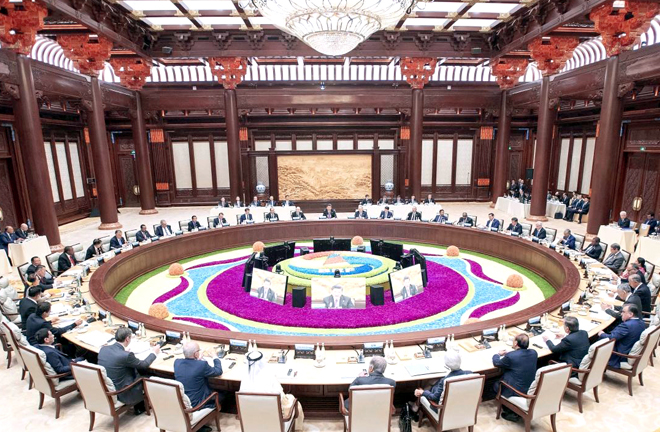Second Belt and Road Forum convened

On April 27, 2019, the leaders’ roundtable of the second Belt and Road Forum for International Cooperation (BRF) was held at the Yanqi Lake International Convention Center in Beijing. Chinese President Xi Jinping was chair. Photo: Li Tao/XINHUA
April 25–27, the Second Belt and Road Forum for International Cooperation (BRF) was convened in Beijing. Chinese President Xi Jinping attended the opening ceremony and delivered a keynote speech.
Xi pointed out that throughout the Eurasian continent, Africa, the Americas and Oceania, Belt and Road (B&R) cooperation has opened up new space for global economic growth, produced new platforms for international trade and investment, and offered new ways for improving global economic governance. He said that this initiative has helped improve people’s lives in the countries involved and created more opportunities for common prosperity.
“What we have achieved amply demonstrates that Belt and Road cooperation has both generated new opportunities for the development of all participating countries and opened up new horizons for China’s development and opening up,” Xi said.
Under the theme of “Belt and Road Cooperation: Shaping a Brighter Shared Future,” attendees from more than 150 countries and more than 90 international organizations exchanged ideas on promoting the B&R and building a community of shared future for mankind.
Recent years have seen the slowdown of the world economy, the rise of populism and protectionism, and the widening of regional disparities and of the gap between the rich and the poor at the national level, said Xie Fuzhan, president of the Chinese Academy of Social Sciences (CASS). At the same time, countries around the world are also facing such global problems as climate change and poverty alleviation.
The fundamental solution for these problems is to promote the sound development of countries and the world economy, for which the B&R has provided an important platform. An increasing number of countries are participating in the construction of the B&R and have received or are receiving benefits through the initiative’s principle of extensive consultation, joint contribution and shared benefits, Xie continued.
As a high-level think tank for philosophy and social science research in China, CASS has found that for the current construction of the B&R, it is necessary to alleviate doubts, gather more consensus, let think tanks play their roles, and take effective measures to dovetail the B&R with the EU’s Junker Plan, Russia’s Eurasian Economic Union, Mongolia’s Road Development Project, Kazakhstan’s Bright Road and Poland’s Amber Road, mutually enhancing each other, jointly promoting the prosperity and development of the world economy and building a community of shared future for mankind, Xie said.
China’s B&R initiative is the most unique initiative that can bring major changes to the world, said former Pakistani Prime Minister Shaukat Aziz. China’s ancient Silk Road has been well-known for thousands of years. Even then, China had the foresight to develop markets and promote exchanges and trade between countries.
We have already seen the benefits of the B&R initiative, which enables greater cooperation and interconnectivity between countries, Aziz continued.
“Two years ago, when I participated in the first BRF, we believed that the B&R would achieve very good results,” said Jiří Paroubek, former Czech prime minister and former leader of the Czech Social Democratic Party. B&R construction plays an important role in driving global economic growth and safeguarding world peace, Paroubek said.
Over the past more than five years, the B&R initiative has received positive responses from an increasing number of countries and international organizations. Joint construction of the B&R has not only promoted China’s development, but also crossed the boundaries of different countries and regions, stages of development, historical traditions, cultures, religions, and customs, making tangible contributions to world development.
Martin Albrow, fellow of the British Academy of Social Sciences, said that the B&R has effectively connected China and the rest of the world. The B&R does not mean global governance in the ordinary sense: It is the embodiment of the concept of the community of shared future for mankind.
The community of shared future requires us to realize that we have mutual interests and that we can achieve mutual benefit through joint efforts, Albrow continued. The B&R is an important measure to move in this direction. Every partner must establish a close connection, communicate thoroughly, understand each other, share common goals and respect each other’s values. It does not matter what term is used here, Albrow said. It is feasible as long as our goals and direction are the same.
edited by JIANG HONG
